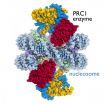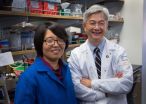(Press-News.org) Griffith University academics are challenging the foundations of quantum science with a radical new theory based on the existence of, and interactions between, parallel universes.
In a paper published in the prestigious journal Physical Review X, Professor Howard Wiseman and Dr Michael Hall from Griffith's Centre for Quantum Dynamics, and Dr Dirk-Andre Deckert from the University of California, take interacting parallel worlds out of the realm of science fiction and into that of hard science.
The team proposes that parallel universes really exist, and that they interact. That is, rather than evolving independently, nearby worlds influence one another by a subtle force of repulsion. They show that such an interaction could explain everything that is bizarre about quantum mechanics
Quantum theory is needed to explain how the universe works at the microscopic scale, and is believed to apply to all matter. But it is notoriously difficult to fathom, exhibiting weird phenomena which seem to violate the laws of cause and effect.
As the eminent American theoretical physicist Richard Feynman once noted: "I think I can safely say that nobody understands quantum mechanics."
However, the "Many-Interacting Worlds" approach developed at Griffith University provides a new and daring perspective on this baffling field.
"The idea of parallel universes in quantum mechanics has been around since 1957," says Professor Wiseman.
"In the well-known "Many-Worlds Interpretation", each universe branches into a bunch of new universes every time a quantum measurement is made. All possibilities are therefore realised – in some universes the dinosaur-killing asteroid missed Earth. In others, Australia was colonised by the Portuguese.
"But critics question the reality of these other universes, since they do not influence our universe at all. On this score, our "Many Interacting Worlds" approach is completely different, as its name implies."
Professor Wiseman and his colleagues propose that:
The universe we experience is just one of a gigantic number of worlds. Some are almost identical to ours while most are very different;
All of these worlds are equally real, exist continuously through time, and possess precisely defined properties;
All quantum phenomena arise from a universal force of repulsion between 'nearby'
(i.e. similar) worlds which tends to make them more dissimilar.
Dr Hall says the "Many-Interacting Worlds" theory may even create the extraordinary possibility of testing for the existence of other worlds.
"The beauty of our approach is that if there is just one world our theory reduces to Newtonian mechanics, while if there is a gigantic number of worlds it reproduces quantum mechanics," he says.
"In between it predicts something new that is neither Newton's theory nor quantum theory.
"We also believe that, in providing a new mental picture of quantum effects, it will be useful in planning experiments to test and exploit quantum phenomena."
The ability to approximate quantum evolution using a finite number of worlds could have significant ramifications in molecular dynamics, which is important for understanding chemical reactions and the action of drugs.
Professor Bill Poirier, Distinguished Professor of Chemistry at Texas Tech University, has observed: "These are great ideas, not only conceptually, but also with regard to the new numerical breakthroughs they are almost certain to engender."
INFORMATION:
Go to: https://journals.aps.org/prx/abstract/10.1103/PhysRevX.4.041013
Griffith scientists propose existence and interaction of parallel worlds
Many Interacting Worlds theory challenges foundations of quantum science
2014-10-30
ELSE PRESS RELEASES FROM THIS DATE:
'Nanomotor lithography' answers call for affordable, simpler device manufacturing
2014-10-30
VIDEO:
Nanoengineers at the University of California, San Diego recently invented a new method of lithography in which nanoscale robots swim over the surface of light-sensitive material to create complex surface...
Click here for more information.
What does it take to fabricate electronic and medical devices tinier than a fraction of a human hair? Nanoengineers at the University of California, San Diego recently invented a new method of lithography in which nanoscale robots swim ...
Greater inequality within UK, USA than some developing countries, trade 'footprint' shows
2014-10-30
The United States and United Kingdom buck the overall trend of developed countries having more egalitarian domestic economies than the countries they trade with.
The finding comes from the first ever 'inequality footprint' of nations, created by researchers at the University of Sydney, demonstrating the link that each country's domestic economic activity has to income distribution elsewhere in the world.
Australia, with a comparable level of international trade activity, still maintains greater internal equality than the trading nations that 42 percent of our consumption ...
Air quality and unconventional oil and gas sites
2014-10-30
Research suggesting air pollutants released by unconventional oil and gas production are well over recommended levels in the US is published today in the open access journal Environmental Health. High levels of benzene, hydrogen sulfide and formaldehyde were found. The study is the first to be based on community sampling by people who live near production sites and could be used to supplement official air-quality monitoring programs.
Unconventional oil and gas come from reserves that do not readily flow to the surface. This is because they are either distributed throughout ...
Frailty increases kidney transplant recipients' risk of dying prematurely
2014-10-30
Regardless of age, frailty is a strong risk factor for dying prematurely after a kidney transplant. The finding, which comes from a new study published in the American Journal of Transplantation, suggests that patients should be screened for frailty prior to kidney transplantation, and that those who are identified as frail should be closely monitored after the procedure.
It's very difficult for physicians to identify which patients with kidney disease will not do well after receiving a kidney transplant. Even the best models are able to correctly discriminate patients ...
Report: 93 percent of mining, oil & gas, logging, agriculture developments involve inhabited land
2014-10-30
LIMA, PERU (30 October, 2014)—In an analysis of almost 73,000 concessions in eight tropical forested countries, more than 93 percent of these developments were found to involve land inhabited by Indigenous Peoples and local communities. According to the research, conducted by The Munden Project, the total amount of land handed over by governments to the private sector for mining, logging, oil & gas drilling, and large-scale agriculture includes at least 40 percent of Peru and 30 percent of Indonesia.
"When governments sell the land, forests and other natural resources ...
More attention to measles, vaccine experts urge
2014-10-29
Doctors and public health authorities need to renew their attention to measles, researchers from Emory Vaccine Center urge in an editorial in the New England Journal of Medicine.
"Because of its high level of contagiousness, measles is the indicator disease for weaknesses of an immunization program," write Walter Orenstein, MD, and Katherine Seib, MSPH.
Orenstein is associate director of the Emory Vaccine Center and professor of medicine at Emory University School of Medicine, and Seib is research manager in Emory's Division of Infectious Diseases.
Measles is one ...
Survival rates in pediatric umbilical cord transplants may indicate a new standard of care
2014-10-29
MINNEAPOLIS-ST. PAUL (October 29, 2014) – A new standard of care for children facing acute myeloid leukemia (AML) may be clear, following a multi-year study published in the latest edition of the New England Journal of Medicine.
The research, led by John Wagner, Jr., M.D., director of the Pediatric Blood and Marrow Transplantation program at the University of Minnesota and a researcher in the Masonic Cancer Center, University of Minnesota, compared outcomes in children with acute leukemia and myelodysplastic syndrome who received transplants of either one or two ...
First detailed picture of a cancer-related cell enzyme in action on a chromosome unit
2014-10-29
A landmark study to be published in the October 30, 2014 print edition of the journal Nature provides new insight into the function of an enzyme related to the BRCA1 breast-cancer protein. The study by a team at Penn State University is the first to produce a detailed working image of an enzyme in the Polycomb Repressive Complex 1 (PRC1) -- a group that regulates cell development and is associated with many types of cancer.
Enzymes like PRC1 turn on or turn off the activity of genes in a cell by manipulating individual chromosome units called nucleosomes. "The nucleosome ...
Strong bonds with pets may help foster resiliency in military-connected children
2014-10-29
NORTH GRAFTON, Mass. Developing resiliency has important benefits for children, especially those from military families faced with significant challenges such as parental deployment and frequent moves. New research published online in Applied Developmental Science supports the idea that, along with other key resources, strong attachments to animals may help military-connected children develop resiliency and other positive developmental traits.
"We were interested in seeing if the specific stressors faced by military-connected families could be mitigated by interacting ...
'Treasure in saliva' may reveal deadly diseases early enough to treat them
2014-10-29
UCLA research could lead to a simple saliva test capable of diagnosing — at an early stage — diabetes and cancer, and perhaps neurological disorders and autoimmune diseases.
The study, the most comprehensive analysis ever conducted of RNA molecules in human saliva, reveals that saliva contains many of the same disease-revealing molecules that are contained in blood. It was published online today by the peer-reviewed journal Clinical Chemistry and will be published in the journal's January 2015 special print issue, "Molecular Diagnostics: A Revolution in Progress."
"If ...
LAST 30 PRESS RELEASES:
Cancer and inflammation: immunologic interplay, translational advances, and clinical strategies
Bioactive polyphenolic compounds and in vitro anti-degenerative property-based pharmacological propensities of some promising germplasms of Amaranthus hypochondriacus L.
AI-powered companionship: PolyU interfaculty scholar harnesses music and empathetic speech in robots to combat loneliness
Antarctica sits above Earth’s strongest “gravity hole.” Now we know how it got that way
Haircare products made with botanicals protects strands, adds shine
Enhanced pulmonary nodule detection and classification using artificial intelligence on LIDC-IDRI data
Using NBA, study finds that pay differences among top performers can erode cooperation
Korea University, Stanford University, and IESGA launch Water Sustainability Index to combat ESG greenwashing
Molecular glue discovery: large scale instead of lucky strike
Insulin resistance predictor highlights cancer connection
Explaining next-generation solar cells
Slippery ions create a smoother path to blue energy
Magnetic resonance imaging opens the door to better treatments for underdiagnosed atypical Parkinsonisms
National poll finds gaps in community preparedness for teen cardiac emergencies
One strategy to block both drug-resistant bacteria and influenza: new broad-spectrum infection prevention approach validated
Survey: 3 in 4 skip physical therapy homework, stunting progress
College students who spend hours on social media are more likely to be lonely – national US study
Evidence behind intermittent fasting for weight loss fails to match hype
How AI tools like DeepSeek are transforming emotional and mental health care of Chinese youth
Study finds link between sugary drinks and anxiety in young people
Scientists show how to predict world’s deadly scorpion hotspots
ASU researchers to lead AAAS panel on water insecurity in the United States
ASU professor Anne Stone to present at AAAS Conference in Phoenix on ancient origins of modern disease
Proposals for exploring viruses and skin as the next experimental quantum frontiers share US$30,000 science award
ASU researchers showcase scalable tech solutions for older adults living alone with cognitive decline at AAAS 2026
Scientists identify smooth regional trends in fruit fly survival strategies
Antipathy toward snakes? Your parents likely talked you into that at an early age
Sylvester Cancer Tip Sheet for Feb. 2026
Online exposure to medical misinformation concentrated among older adults
Telehealth improves access to genetic services for adult survivors of childhood cancers
[Press-News.org] Griffith scientists propose existence and interaction of parallel worldsMany Interacting Worlds theory challenges foundations of quantum science



